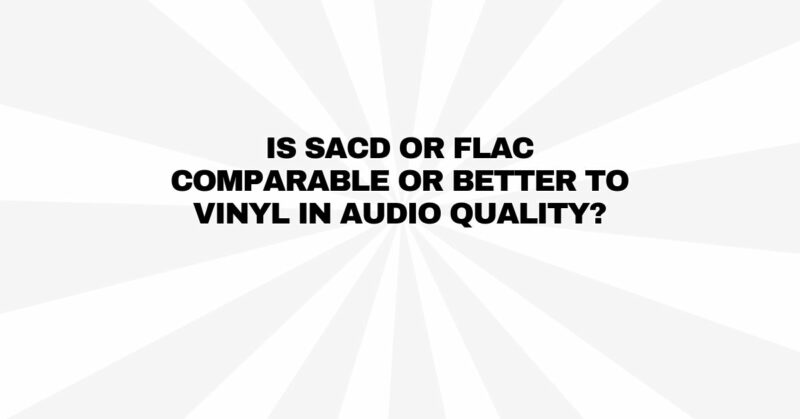The realm of high-quality audio formats has seen significant evolution in recent years, with various formats vying for audiophiles’ attention. Two such contenders are Super Audio CD (SACD), which represents a physical high-resolution format, and FLAC (Free Lossless Audio Codec), a digital lossless format. Both are often compared to the analog charm of vinyl records when it comes to audio quality. In this article, we will explore the characteristics of SACD, FLAC, and vinyl records to determine how they stack up in terms of audio quality.
Understanding SACD:
Super Audio CD (SACD) is a high-resolution physical audio format developed by Sony and Philips. SACD discs can contain both stereo and multi-channel audio tracks. Key characteristics of SACD include:
- High Resolution: SACD offers high-resolution audio with sampling rates of up to 2.8 MHz (64 times the standard CD sampling rate) and 5.6 MHz for some multi-channel tracks. This high resolution results in exceptionally detailed and lifelike sound.
- DSD Encoding: SACD uses Direct Stream Digital (DSD) encoding, a pulse-density modulation encoding technique known for its audio fidelity. DSD captures audio with a continuous waveform rather than breaking it into discrete samples.
- Hybrid Discs: Some SACD releases are hybrid discs, containing both SACD and standard CD layers. This allows them to be played on regular CD players as well as SACD-compatible players.
- Physical Medium: SACD is a physical format that requires specialized SACD players to access its full audio quality.
Understanding FLAC:
FLAC (Free Lossless Audio Codec), on the other hand, is a digital audio format known for its lossless compression. Key characteristics of FLAC include:
- Lossless Compression: FLAC achieves high compression ratios without any loss of audio quality. It preserves all the original audio data during compression and accurately reproduces the source audio when decoded.
- Digital Precision: FLAC files capture the entire frequency and dynamic range of the original recording with high precision. They offer bit-for-bit accuracy, ensuring that no audio detail is lost.
- Convenience: FLAC files are versatile and can be played on various digital devices and software. They offer a straightforward way to store and transmit high-quality audio digitally.
- Digital Medium: FLAC is a digital format, which means it can be streamed over the internet, stored on digital media, and played on a wide range of devices with compatible software or hardware.
Comparing SACD, FLAC, and Vinyl Records:
To determine whether SACD or FLAC is comparable or better than vinyl in terms of audio quality, we need to consider several factors:
- Audio Quality: SACD offers high-resolution audio with exceptional detail and clarity, making it a preferred choice for audiophiles who seek the highest level of fidelity. FLAC files also provide lossless audio quality, closely replicating the original recording. Vinyl records, while cherished for their analog warmth and character, can introduce imperfections and noise during playback.
- Convenience: SACD requires specialized hardware (SACD players) to access its full audio quality, making it less convenient and portable compared to FLAC, which can be played on a wide range of digital devices. Vinyl records require turntables and physical storage space.
- Tactile Experience: Vinyl records offer a unique tactile engagement that some listeners find deeply satisfying. SACD and FLAC, being digital formats, lack this physical interaction.
- Subjective Preference: The preference for SACD, FLAC, or vinyl often depends on individual tastes. Some listeners prioritize the precision and convenience of digital formats, while others value the analog warmth and character of vinyl records.
Conclusion:
Determining whether SACD or FLAC is comparable or better than vinyl in audio quality is a subjective endeavor that depends on individual preferences and priorities. SACD offers unparalleled high-resolution audio quality and is a preferred choice for audiophiles who prioritize fidelity above all else.
FLAC, as a digital lossless format, also offers exceptional audio quality and the convenience of digital playback. It has become a popular choice for those who value both audio fidelity and convenience.
Vinyl records, while known for their analog warmth and tactile engagement, introduce analog imperfections that some listeners find charming but others may perceive as flaws.
Ultimately, the choice between SACD, FLAC, or vinyl comes down to the specific qualities one values in their listening experience. Some listeners may prefer the clinical accuracy and convenience of digital formats, while others are drawn to the warmth and authenticity of analog playback. Each format has its place in the world of audio, catering to the diverse preferences of audiophiles and music enthusiasts.


